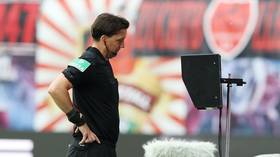Guilty as charged: Stadium worker unplugs VAR during football match to charge his mobile phone

The newly-introduced VAR system suddenly stopped working during a football match in Saudi Arabia, after one of the stadium staff members unplugged it to charge his mobile phone.
The bizarre incident took place on Tuesday during a match between local sides Al-Nassr and Al-Fateh.
READ MORE: Cristiano Ronaldo’s trolling of VAR highlights joyless nature of new football technology
The video replay system, which has been used in the Saudi Premier League for more than a year, failed to work, and the reason was rather unusual.
VAR has been heavily criticized for not working properly and causing controversy, but this time around the technical malfunction was caused by a stadium employee who urgently needed to charge his phone.
⚽️✋ En el partido entre Al-Nassr y Al-Fateh de la Liga Profesional Saudí, el VAR dejo de funcionar repentinamente. 🤔Lo que descubrieron después fue que un trabajador del estadio lo desconectó para poder cargar su celular. 📱¡Prioridades! 😅 pic.twitter.com/YYnc5pSSJf
— KAREN MANZANO (@KarenManzano) October 8, 2019
The man plugged in his cell phone charger without knowing that he had just disconnected the electricity from devices running the VAR system.
The controversy didn’t affect the game, with Al-Nassr winning 1-0, thanks to a 49th minute goal from Firas Al-Buraikan.
مصادر "الرياضية": سبب تعطل تقنية VAR في مباراة الفتح والنصر هو فصل أحد العاملين في الملعب الأسلاك الخاصة بالتقنية بغية شحن هاتفه الخاص دون علمه بفصل الكهرباء عن الأجهزة المشغلة للتقنية..
— صحيفة الرياضية (@ariyadhiah) October 7, 2019
The chairman of the Saudi Arbitration Committee, Fernando Trisaco, said after the match that the use of VAR is still a problem.
“As software, VAR still has many drawbacks,” he said.
VAR was introduced in the Saudi Professional League and the Arabian Gulf League in the 2018-19 season after it was successfully tested at the 2018 FIFA World Cup in Russia.














